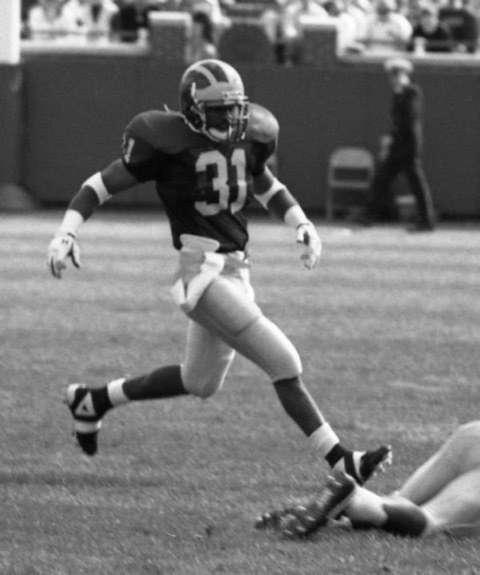
By Jadyn Zdanavage
For recent University of Michigan alums like JJ McCarthy and Blake Corum, the 2024 NFL draft marked the beginning of a new journey. But, for Michigan alum Tony Blankenship, the draft granted a time of reflection and gratitude.
On April 26th, U of M graduate Tony Blankenship received the 2024 Wally Triplett Coach of the Year Award as part of the NFL draft festivities in Detroit. The award recognized Blankenship for his dedication, leadership, and support as a coach to Metro Detroit’s youth.
The award’s namesake, Wally Triplett, was a part of the 1949 NFL draft class which was the first year Black players were eligible. He became the first Black draftee to play in the NFL as a linebacker for the Lions. Triplett went on to make his mark on the game, setting the NFL’s single-game record for kickoff returns with 294 yards.
Like Triplett, Blankenship has also made his mark on the game of football in the state of Michigan. In 2021, he was inducted into the Michigan High School Football Coaches Association (MHSFCA) Hall of Fame. During his playing career at the University of Michigan, he was a part of four Big 10 Championships and a Rose Bowl Championship in 1993.
Blankenship attributes the success he has had in his football career to his parents. He describes that his parents “created the foundation” for him and his brother by giving them opportunities to play sports from a young age. It was those early opportunities that allowed Blankenship to develop his love for football and the team camaraderie that came with it.


During his early playing days, Blankenship commends his little league football coach John Cunningham who exemplified the impact a coach could have on young people’s life. Blankenship described Cunningham as a “connected father” away from home and an influential figure in his life during his transformative adolescent years.
After leaving Murray-Wright High School for the University of Michigan, Blankenship was under the guidance of more influential coaches, most notably Bo Schembechler and Bill Harris. According to Blankenship, their detail-oriented and methodical approach to coaching is what drove the Wolverines to being a consistent powerhouse during Blankenship’s time in a Michigan uniform from 1989-1993.
Blankenship credits the “perfectionist mindset” both Harris and Schembechler embodied for allowing him to realize that he would be able to have success as a head coach as well. His mindset combined with his experiences in championship moments as a player at Michigan fueled his goals during the early parts of his coaching career.
However, success did not come easy. In fact, in Blankenship’s early years of coaching, failing is what stood out the most to him. He explains, “not winning early was really everything because it drove me.” Blankenship wanted to be a champion and lead successful teams like his coaches at Michigan.
During this period of struggle, one of Muhammad Ali’s quotes epitomized Blankenship’s approach as a coach. Ali stated, “I hated every minute of training, but I said, ‘Don’t quit. Suffer now and live the rest of your life as a champion.’” Blankenship began perfecting his approach to the game, meticulously planning and devoting himself 100% to the team. His strong work ethic and commitment helped create opportunities for success later down the road in his coaching career.
In 28 years of coaching, Blankenship has certainly embodied what it means to be a champion. He led his teams to four Detroit PSL Division Championships and a 2018 District Championship, while being named a MHSFCA Regional Coach of the Year three times throughout his career.
However, being a coach is not just about success but establishing a culture that transcends football. Blankenship’s goal for his players is, “to be better men than what they were when they came into my life [so that they can] go out into society and be a positive person and help the world.” His commitment to bettering his players as young men is why his impact extends far beyond football. He prioritizes cultivating a positive practice atmosphere that allows his players to enjoy being there while simultaneously feeling like they are driven to be their best.
Blankenship’s desire for his players to become the best versions of themselves is his “it” factor that has driven him everyday. His desire to be the best coach he can be for his kids, and developing connections with his players is what Blankenship treasures most from his storied career.
Blankenship attributes his ability to connect with his players to the power of God at work in his life. Blankenship states, “In everything I do I want to do it in a loving way. I want to do it with love connected to it, and that’s God, not me. That’s him working through me and using me as a vessel.”
Blankenship has certainly been a vessel who has shown love, support, and encouragement to his players. The impact he has made has been lifelong for his players. At the end of the day, it’s coaches like Blankenship that help mold the next journalists, engineers, actors, and NFL draftees to be ready to take on the next chapter of their lives.
